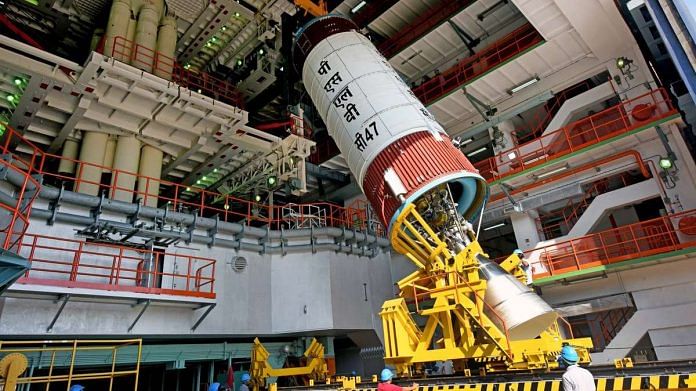With the announcement of IN-SPACe, the Narendra Modi government has opened the space sector for private participation in a big way. The Indian Space Research Organisation chairman K. Sivan Thursday welcomed the structural reforms in India’s space ecosystem. Finance Minister Nirmala Sitharaman had last month hinted at giving private firms access to ISRO’s facilities as part of the Aatma Nirbhar Bharat special economic package.
Also read: Why Indian space start-ups are feeling forced to set up base abroad
An autonomous regulator
Sivan informed that an autonomous body IN-SPACe (Indian National Space Promotion and Authorisation Centre) would be established under the Department of Space (DoS) for permitting and regulating activities of the private space sector. This nodal entity would have its own independent directorates for technical, legal, safety and security, monitoring as well as activities promotion for assessing the private industry requirements and further coordinating the activities.
At theTakshashila Institution, we had argued about the need for an independent space regulator and drafted a space bill. An independent regulator such as IN-SPACe would pave the way for regulatory clarity, and reduce arbitrariness and discretion in the governance process.
Although India is late to the party when it comes to enabling the private sector and leveraging their skills, it still has an opportunity to learn from other countries’ experiences. In the United States, one of the concerns of the private space sector is the multiplicity of regulatory bodies. Federal Aviation Administration (FAA)’s Office of Commercial Space Transportation (AST) is the nodal agency for licensing launches and re-entries; National Oceanic and Atmospheric Administration’s (NOAA) approval is required for commercial remote-sensing satellites; and the Federal Communications Commission (FCC) deals with frequency issues related to commercial communications satellites. India has an opportunity to leapfrog into a system that can provide smooth, single-window clearances. Lessons from the experience of establishing independent regulators in telecom, civil aviation and insurance would also come in handy.
That the IN-SPACe board would have representations from the government, academia, and industry reflects the holistic nature of the reform. However, it will also help if the board has members from ministries such as telecom and defence, so that activities such as frequency allocation and orbital slot allotment, which require international liaising and coordination, can be accomplished efficiently. This will ensure that the private sector has a single point of contact with the government for all its regulatory requirements. A board composed of multiple, diverse stakeholders is critical and its composition would be eagerly anticipated by the ecosystem as the new body takes shape.
Also read: ISRO congratulates NASA and SpaceX for their manned mission, calls it ‘historic’
Hiving off routine functions
ISRO’s original mandate was to conduct cutting-edge research on frontier space science and technology, and develop space assets of national importance. While ISRO continues to break barriers, over the past few years, it has become increasingly involved in operational activities such as commercial launches, production of satellites based on legacy technology, and space-based services.
Meanwhile, a nascent private sector in India has come up in the past 10 years across the space value chain that can share some of ISRO’s load. Started by dynamic, young entrepreneurs who are trained at the best institutes and facilities from around the world, these startups aim to be partners and not contractors to ISRO. However, India’s share of the pie in the global space business is still minuscule. Hence, institutional support and guidance in the form of steps such as opening up of ISRO’s centres and labs for research and development (R&D) activities are required for these private companies to reach the potential they exhibit.
The ISRO chairman said that NewSpace India Ltd. (NSIL) would be re-defined from a “supply-driven model to demand driven model for space-based services.” NSIL would be strengthened to “off-load operational activities of ISRO in the areas of launch vehicle & satellite production, launch services as well as space-based services” and execute these activities through industry consortiums.
This is largely a step in the right direction for three reasons. First, it would free up the resources for ISRO to focus on R&D. Second, this model of execution would increase industry participation, creating economic value and more jobs in the sector. Third, the government can choose to gradually disinvest from the public sector undertaking NSIL. This would help the government generate revenue. Moreover, it would make NSIL accountable to its shareholders, thus creating incentives for efficient management of the company.
Also read: These are the 2 steps Modi govt needs to take for its space reforms to take off
New policy framework
The ISRO chief also highlighted the need for a new navigation policy and changes in the 2011 Remote Sensing Data Policy and the 1997 SATCOM policy. These policies have become dated and no longer represent the realities or fulfil the requirements of the sector.
The Draft Space Activities Bill of 2017, too, was inadequate and proposed broad-brush regulations for all space activities in the value chain. At this stage of India’s space journey, we need a comprehensive policy document that understands the specific technical, safety, and environmental risks and benefits associated with different space activities, and proposes soft-touch regulation that can mitigate the risks and maximise the benefits. A parliamentary sanction through the passage of a space bill would codify the intent and create a predictable policy environment.
The Modi government’s announcement of IN-SPACe is a step towards providing a level-playing field to India’s private players. India needs to keep the foot on the pedal to take advantage of the skills in the private sector and for ISRO to achieve its space dream.
Utkarsh Narain @utkarsh01 is a research analyst in the technology policy vertical at the Takshashila Institution in Bengaluru. Views are personal.



